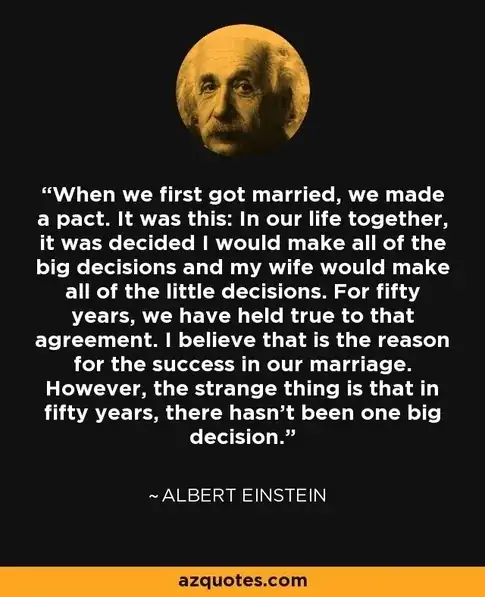The quote is really that of Garson Kanin as author of the 1974 book Hollywood: Stars and Starlets, Tycoons and Flesh-peddlers, Moviemakers and Moneymakers, Frauds and Geniuses, Hopefuls and Has-beens, Great Lovers and Sex Symbols, at page 181:
A successful film is one on which most of the decisions have been correct; an unsuccessful film is the opposite. It comes down to the question: Who makes the decisions?
Professor Albert Einstein and his wife were being interviewed by the world press on the occasion of their golden wedding anniversary. They were asked the routine question: “To what do you attribute the success of your marriage?” Professor Einstein took his wife's hand in his and replied, “Well, when we were first married fifty years ago-gott im Himmel!—fifty years—we made a pact. It was this. That in our life together I would make all the big decisions and she would make all the little decisions. And we have kept to it for fifty years. That, I think, is the reason for the success of our marriage.” Then he looked up and added, “The strange thing is that in fifty years there hasn't yet been one big decision.”
Things have changed, but in Hollywood until the 1950s, the final decisions, great and small, were made by the front offices...
Kanin was reattributing a pre-existing joke to Einstein.
For example in the 1956 National Wholesale Druggists Yearbook, volume 82, quoting entertainment by John Charles Daly
Harry said "Look there is nothing to it. When we got married, we made a pact. We agreed she would make the small decisions and I would make the big decisions. We never violated that agreement. As a result, we have never had a cross word with one another for twenty years and we are going to go along for twenty more on the same basis."
Joe said, "That is fine. What is the difference, where do you draw the line? You say Mary makes the small decisions. What does she decide?"
"Well," he said, "Mary decides, for instance, where I work; should we buy a house; where the kids go to school; you know that kind of thing." (Laughter)
Joe said, "If those are the small things, what do you do?"
He said, "Oh, I make the big decisions, should we recognize Red China? What are we going to do about Nasser?"
And from 1952, in Collier's, Volume 129:
"When Gwen and I got married," Donald says thoughtfully "we decided who was boss right away. We agreed that all big decisions were mine. All little decisions were hers. Of course," he adds, "we haven't made any really big decisions".
And from the 1951 book Christian Love:
One husband after a year of marriage reported to a masculine friend, "We decided that she would make the little decisions and I would make the big ones, and we are getting along fine; no big decisions have come up so far."
The oldest example, from 1947, in The Tax Structure of the State of Washington, seems to have the genders reversed:
Senator Jack Rogers speaking:
We have a similar agreement in the Rogers family. When Mrs. Rogers and I were married, she said, "Now Jack, I'm going to take care of the major decisions and you take care of the minor decisions.” So far there have been no major decisions to make. I see to that.
